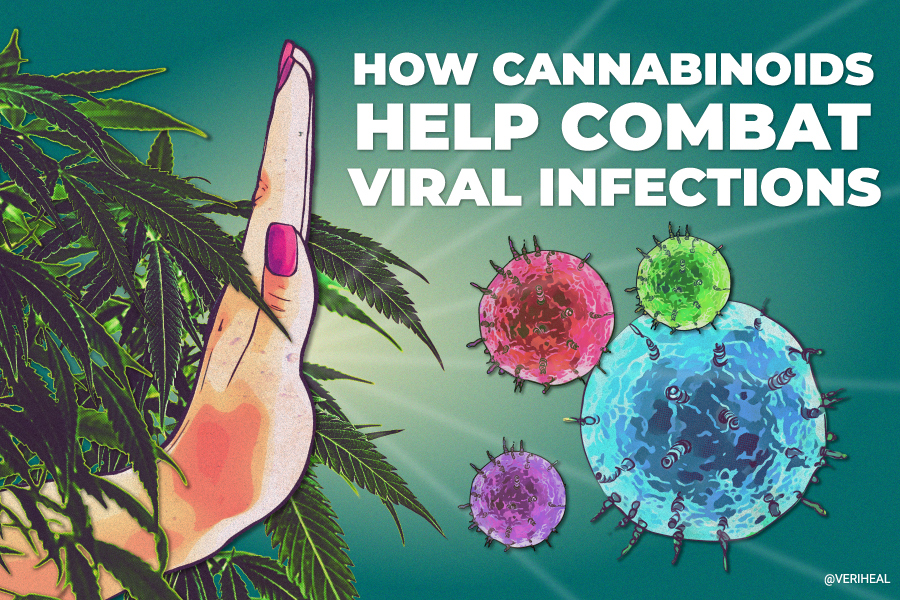Treating Hepatitis C with Medical Marijuana
- What are the Signs, Symptoms, and Types of Hepatitis C?
- Are Cannabinoids a Good Treatment Option for Hepatitis C?
- How Does the Endocannabinoid System (ECS) Play a Role in Treating Hepatitis C?
- What Cannabis Preparations are Suitable for Hepatitis C
The Hepatitis C virus (HCV) causes a viral infection that can result in severe liver damage and inflammation in infected individuals. HCV is transmitted from person-to-person through contaminated blood. Although the virus is short-lived for some people, more than half of HCV patients will sustain long-term effects (11).
An estimated 58 million worldwide suffer the symptoms associated with chronic hepatitis C virus infection, with approximately 1.5 million new infections transpiring annually (16). However, estimates published on WebMD suggest that the global prevalence of HCV is 130-175 million people. Moreover, as many as 2.4 million people in the U.S. are believed to have the disease (15).
Aside from the potential liver inflammation that HCV can cause, Chronic hepatitis C may also trigger the onset of liver cancer, liver scarring (cirrhosis), and in the worst-case scenario, death (1). Fortunately, it is possible to treat and even cure chronic HCV.
Previously, HCV patients were limited to using weekly injections and orally administered medicines to treat the infectious virus. Thanks to advancements in pharmaceutical drug development, over 95% of patients can effectively cure their chronic HCV by consuming daily medications for 2-6 months (11). Hepatitis C is one of the few conditions known to medicine with a well-established cure.
Medical marijuana is gaining newfound attention as a potential therapeutic aid for people living with HCV symptoms. However, this is not to say that cannabis can treat the infection alone. Instead, this natural substance may present patients with an opportunity to relieve some of the symptoms and the possible side effects of HCV medications, such as nausea.
What are the Signs, Symptoms, and Types of Hepatitis C?
Hepatitis C falls into two broad categories: acute and chronic. Symptoms don’t always manifest to a noticeable degree, which is why around half of the people with HCV are unaware that they are infected with the virus. In fact, in many cases, the symptoms of this disease can take decades to appear (8).
Because of this, the U.S. Preventive Services Task Force advises all adults aged 18-79 to undergo a screening for hepatitis C, even if they don’t exhibit any symptoms. Screening for HCV involves testing a blood sample to determine whether or not antibodies (disease-fighting proteins) that react to the virus are present. A second test will take place to assess the level of HCV in the blood.
Generally, the most high-risk group includes people of all ethnicities and from all walks of life who were born between 1945 and 1965. This age group is five times more susceptible to HCV than younger generations (8).
When someone is infected with the hepatitis C virus for a long time, a doctor will diagnose chronic HCV. Chronic HCV is described as a “silent” infection because symptoms often go unnoticed for years, and usually results in severe liver damage.
Some of the most common signs and symptoms of HCV — which tend to linger for 2-12 weeks — include the following:
- Appetite loss
- Abdominal fluid buildup (ascites)
- Bleeding and bruising easily
- Confusion
- Dark/cloudy urine
- Fatigue/drowsiness
- Fever
- Leg swelling
- Muscle aches
- Nausea
- Speech, movement, and cognitive problems (hepatic encephalopathy)
- Skin itchiness
- Red/purple blotches on the skin caused by dilated blood vessels (capillaries)
- Visible spider-like blood vessels on the skin (spider angiomas)
- Weight loss
- Yellow skin and eye discoloration (jaundice)
It should be noted that every chronic hepatitis C infection begins with an acute stage. Nonetheless, not every acute hepatitis C infection progresses to the chronic phase. Patients diagnosed with HCV might also experience fatigue, fever, appetite loss, yellow skin and eyes, web-like blood vessel blotches in the skin, weight loss, and depression.
Typically, the signs and symptoms of acute HCV in hepatitis C patients are noticeable 1-3 months after the first exposure to the virus. Acute symptoms last anywhere from two weeks to three months, depending on each person’s unique biochemistry and immune system.
Individuals who contract acute HCV may experience ‘spontaneous viral clearance’ — a process whereby HCV is eliminated from their body swiftly after the acute phase.
Past studies of people diagnosed with acute HCV have shown that the rates of spontaneous viral clearance range from 15%-25%. Antiviral therapy has demonstrated positive outcomes when administered to patients with either acute or chronic hepatitis C (4).
Hepatitis C: Causes and Complications
When the liver becomes infected by the hepatitis C virus (HCV), a person will be diagnosed with hepatitis C. Infected individuals spread the virus to one another through blood contact and bodily fluid exposure. In most cases, the infection is transferred through the shared use of drug-related needles and equipment.
Hepatitis C virus progresses to a chronic infection in over half of the people who get an infection. Two examples of chronic infection associated with HCV include cirrhosis and hepatocellular carcinoma. Failure to get treatment may also result in long-term health problems, such as liver damage, liver failure, liver cancer, and, in severe cases, death.
In 2018, 15,713 hepatitis C-related deaths were reported to the Centers for Disease Control and Prevention (CDC), but this figure is likely underestimated (1). Moreover, the disease is the most common reason for liver transplantation in the U.S.
Let’s take a better look at the three main types of HCV:
- Incubation Period — This is the time stretching from initial exposure to HCV to the disease’s official onset. The incubation period can linger from 14 to 80 days, but the typical length is 45 days.
- Acute Hepatitis C – If HCV leaves a person’s body within six months of the virus first invading it, a doctor will diagnose acute hepatitis C. After this acute stage, the body may dispel the virus naturally.
- Chronic Hepatitis C – As many as 85% of people with hepatitis C will endure symptoms for longer than six months. This is called chronic hepatitis C, and it can result in permanently damaging health problems, including cirrhosis, liver cancer, liver failure, and other health conditions mentioned above.
Are Cannabinoids a Good Treatment Option for Hepatitis C?
The first line of defense against hepatitis C is an antiviral medication. Doctors will usually prescribe antiviral medication to patients for 24-72 weeks, depending on the severity of the virus. Treatment of this kind can cause flu-like symptoms to surface, including anemia and neutropenia. However, thanks to advancements in pharmaceutical drug manufacturing, patients can now banish the virus from their bodies within 12 weeks.
According to the National Organization for the Reform of Marijuana Laws (NORML), a cannabis advocacy group that works to grant cannabis consumers and patients greater access to legal marijuana and social justice, many people who suffer from HCV consume cannabis to reduce general symptoms. In particular, smokable cannabis proves to be very popular among HCV patients.
In addition, the use of cannabis in cases of hepatitis C infection does not directly affect liver biopsy histology or treatment outcomes of hepatitis C virus antiviral therapy, based on the findings of a study featured in the Canadian Journal of Gastroenterology and Hepatology (7). The study gleaned cannabis use data from 550 patients at The Ottawa Hospital Viral Hepatitis Clinic in Ontario between 2000 and 2009. This contrasts with previous 2008 findings that cannabis use promoted moderate to severe fibrosis in HCV patients, which was also a smaller study (6).
Research published in the Canadian Journal of Gastroenterology and Hepatology, the official clinical practice journal of the American Gastroenterological Association, purports that medical marijuana may help to relieve the unpleasant symptoms of hepatitis C (6). Some examples of the most commonly reported symptoms alleviated by cannabis in HCV patients include nausea, loss of appetite, and depression (3).
A study titled “Neuroprotection by Cannabinoids in Neurodegenerative Diseases” learned that cannabinoids might successfully reduce the progression of ALS neuroinflammatory diseases through both CB1 and CB2 receptors (10). Since there is substantial evidence that HCV infection is associated with developing neurological and neurodegenerative disorders, these findings lend credibility to the claims that cannabis may benefit HCV patients at risk for developing neurological complications.
Another study, titled “Immunoregulatory Role of Cannabinoids During Infectious Disease,” found that the “moderate use of cannabis may help treatment adherence in patients with hepatitis C because it stabilizes weight loss and nausea (5).” However, they did importantly note that cannabis use may increase the susceptibility to a variety of infections due to its immune-modifying effects.
How Does the Endocannabinoid System (ECS) Play a Role in Treating Hepatitis C?
Heightened endocannabinoid levels in situ have been shown in acute and chronic hepatitis, cirrhosis, and hepatic steatosis (17). Endocannabinoids are an integral element of the endocannabinoid system (ECS). The effects of cannabis surface when these signaling molecules bind with either CB1 or CB2 receptors (12). CB1 receptors are also increased in chronic Hepatitis C patients (9).
Endocannabinoids are crucial mediators in neuroendocrine and psychiatric processes, including drug reward, energy metabolism, and food intake. Various cell lines in the liver express cannabinoid receptors, including endothelial cells, hepatocytes, myofibroblastic cells, and potentially cholangiocytes.
When you consider that hepatitis C sparks inflammatory responses inside the liver, it’s understandable why some scientists and doctors are leaning towards using ECS-stimulating cannabinoids with anti-inflammatory compounds, such as cannabidiol (CBD).
2022 research suggests a complicated effect where CB1 activation and endocannabinoids may drive fibrosis, so blocking them could be a suitable approach, while CB2 activation helps tone down inflammation and has antifibrotic effects (9). Due to its CB1 and CB2 receptor activation, it seems there is not enough information as to whether THC is advisable for people with chronic liver diseases. More studies are needed to fully understand the connection between cannabinoids in the ECS and hepatitis C.
What Cannabis Preparations Are Suitable for Hepatitis C?
The type of cannabis preparation you choose to assist you with symptomatic relief depends on your personal preferences. Various preparations are available for cannabis users, including edibles, capsules, pills, tablets, dissolvable cannabis powder, transdermal patches, vapes, tinctures, and smokable flower.
Keep in mind that some preparations offer better bioavailability than others, as well as different times of onset. CBD and THC have different effects because they work on separate receptors. Discussing your options with a doctor who is educated on medical cannabis is the best course for first-time medical marijuana users.
Talking to Your Doctor About Hepatitis C Treatments
To better understand exactly what type of hepatitis you are dealing with and whether or not your symptoms are associated with a different type of medical condition, it’s essential to visit a qualified doctor for a physical evaluation and treatment.
Visiting a hepatologist should be at the top of your priority list if you have hepatitis C or another liver disease. Doctors in this line of work identify as gastroenterologists who maintain extensive training in liver disease as a hepatologist.
Once a diagnosis has been made, you can start discussing the medical benefits of cannabis-based treatment options with a doctor. However, it’s important to note that daily cannabis use should not be used as a substitute for other doctor-prescribed medications and treatments.
Complementary Treatments Worth Discussing with Your Doctor
Complementary medicine, otherwise known as “alternative medicine” and “complementary therapies,” can be added to your doctor-prescribed treatment regimen for Hepatitis C. Such treatment methods should not be relied on to treat the virus alone, but they may help strengthen the body’s natural healing capabilities.
Examples of complementary medicine that are generally welcomed in cases of HCV include medical cannabis, supplements like silymarin (a milk thistle extract), and HCV medications like Ribavirin and direct-acting antivirals (DAAs) (13, 2). Some other complementary treatments for Hepatitis C include colloidal silver, green tea extract, Glycyrrhizin, silymarin, turmeric, naringenin, vitamin D, and zinc (14).
Although medical marijuana use and other complementary medicines can enhance the quality of life for you or a loved one with HCV, you must continue using any medication(s) and treatments your doctor prescribes.
Note: The content on this page is for informational purposes only and is not intended to be professional medical advice. Do not attempt to self-diagnose or prescribe treatment based on the information provided. Always consult a physician before deciding on the treatment of a medical condition.
- Centers for Disease Control and Prevention. (2020, July 28). What is hepatitis C – FAQ. Centers for Disease Control and Prevention. Retrieved November 3, 2022, from https://www.cdc.gov/hepatitis/hcv/cfaq.htm#:~:text=Hepatitis%20C%20can%20be%20a,liver%20cancer%2C%20and%20even%20death.
- Cherney, K. (2022, May 4). Hepatitis C medications: A full list. Healthline. Retrieved November 3, 2022, from https://www.healthline.com/health/hepatitis-c/full-medication-list
- Fischer, B., Reimer, J., Firestone, M., Kalousek, K., Rehm, J., & Heathcote, J. (2006). Treatment for hepatitis C virus and cannabis use in illicit drug user patients: Implications and questions. European Journal of Gastroenterology & Hepatology, 18(10), 1039–1042. https://pubmed.ncbi.nlm.nih.gov/16957507/
- Grebely, J., Prins, M., Hellard, M., Cox, A. L., Osburn, W. O., Lauer, G., Page, K., Lloyd, A. R., & Dore, G. J. (2012). Hepatitis C virus clearance, reinfection, and persistence, with insights from studies of injecting drug users: Towards a vaccine. The Lancet Infectious Diseases, 12(5), 408–414. https://www.ncbi.nlm.nih.gov/pmc/articles/PMC3608418/
- Hernández-Cervantes, R., Méndez-Díaz, M., Prospéro-García, Ó., & Morales-Montor, J. (2017). Immunoregulatory role of cannabinoids during infectious disease. Neuroimmunomodulation, 24(4-5), 183–199. https://www.karger.com/Article/FullText/481824
- Ishida, J. H., Peters, M. G., Jin, C., Louie, K., Tan, V., Bacchetti, P., & Terrault, N. A. (2008). Influence of cannabis use on severity of hepatitis C disease. Clinical Gastroenterology and Hepatology, 6(1), 69–75. https://www.ncbi.nlm.nih.gov/pmc/articles/PMC3184401/
- Liu, T., Howell, G. T., Turner, L., Corace, K., Garber, G., & Cooper, C. (2014). Marijuana use in hepatitis C infection does not affect liver biopsy histology or treatment outcomes. Canadian Journal of Gastroenterology and Hepatology, 28(7), 381–384. https://pubmed.ncbi.nlm.nih.gov/25157529/
- Mayo Foundation for Medical Education and Research. (2021, August 31). Hepatitis C. Mayo Clinic. Retrieved November 3, 2022, from https://www.mayoclinic.org/diseases-conditions/hepatitis-c/symptoms-causes/syc-20354278
- Mboumba Bouassa, R.-S., Sebastiani, G., Di Marzo, V., Jenabian, M.-A., & Costiniuk, C. T. (2022). Cannabinoids and chronic liver diseases. International Journal of Molecular Sciences, 23(16), 9423. https://www.ncbi.nlm.nih.gov/pmc/articles/PMC9408890/
- Milano, W., & Capasso, A. (2018). Neuroprotection by cannabinoids in Neurodegenerative Diseases. Alzheimer’s, Dementia & Cognitive Neurology, 2(1). https://www.oatext.com/neuroprotection-by-cannabinoids-in-neurodegenerative-diseases.php
- Office of Infectious Disease and HIV/AIDS Policy (OIDP). (2021, July 9). Hepatitis C basics. HHS.gov. Retrieved November 3, 2022, from https://www.hhs.gov/hepatitis/learn-about-viral-hepatitis/hepatitis-c-basics/index.html
- Raypole, C. (2019, May 17). Endocannabinoid system: A simple guide to how it works. Healthline. Retrieved November 3, 2022, from https://www.healthline.com/health/endocannabinoid-system#:~:text=Endocannabinoids%20can%20bind%20to%20either,spinal%20nerve%20to%20relieve%20pain.
- U.S. Department of Health and Human Services. (n.d.). Hepatitis C and dietary supplements. National Center for Complementary and Integrative Health. Retrieved November 3, 2022, from https://www.nccih.nih.gov/health/hepatitis-c-and-dietary-supplements
- WebMD. (n.d.). Complementary and alternative treatments for hepatitis C. WebMD. Retrieved November 3, 2022, from https://www.webmd.com/hepatitis/hep-c-complementary-treatments
- WebMD. (n.d.). Hepatitis C – what is hep C? symptoms, causes, diagnosis, treatment. WebMD. Retrieved November 3, 2022, from https://www.webmd.com/hepatitis/digestive-diseases-hepatitis-c
- World Health Organization. (n.d.). Hepatitis C. World Health Organization. Retrieved November 3, 2022, from https://www.who.int/news-room/fact-sheets/detail/hepatitis-c
- Zamora-Valdés, D., Ponciano-Rodríguez, G., Chávez-Tapia, N. C., & Méndez-Sánchez, N. (2005). The endocannabinoid system in chronic liver disease. Annals of Hepatology, 4(4), 248–254. https://www.elsevier.es/en-revista-annals-hepatology-16-articulo-the-endocannabinoid-system-in-chronic-S1665268119320472









